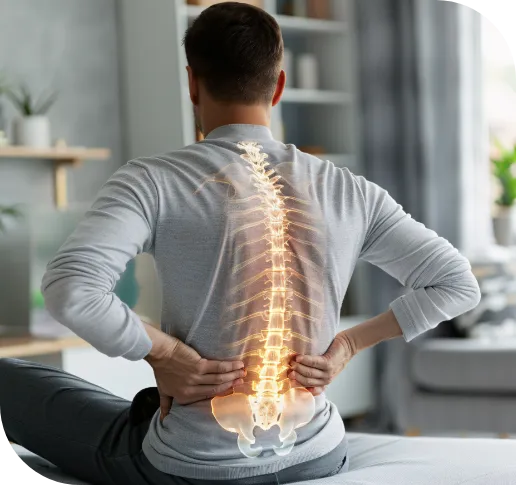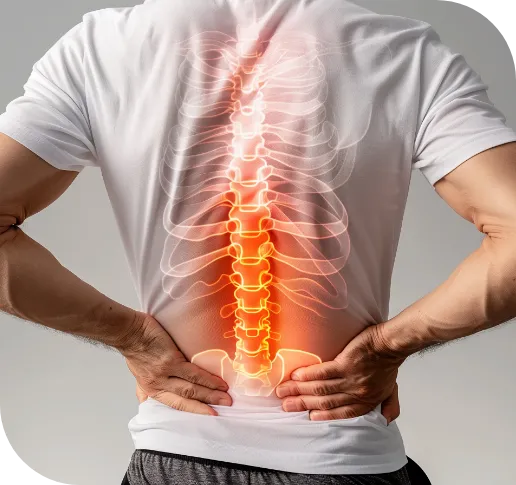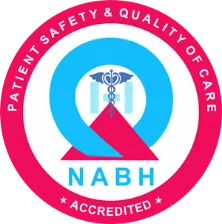SreeRudra Ayurveda Multispecialty Hospital in Alappuzha, Kerala, India, is the ideal destination for those seeking lasting relief from back pain. Situated in a serene and peaceful environment, this hospital provides the perfect setting for individuals to find a complete cure for their back pain.


The low back is a well-engineered structure of bones, nerves, and joints, etc. that provide support, strength, and flexibility. It is the condition that occurs when the bone and cartilages undergo wear and tear. The causes of this condition involve bone spurs, dehydrated spinal disk, herniated disks, injury etc. The risk factors include neck injuries, work-related activities, holding the neck in an uncomfortable position for longer periods,. are the causes of low back pain. The pains can be of different types such as pain that travels to the buttocks, legs, and feet, pain that is worse after prolonged sitting, pain that feels better when changing positions, pains that are worse after waking up, etc.
It is the condition that occurs when the bone and cartilages undergo wear and tear. The causes of this condition involve bone spurs, dehydrated spinal disk, herniated disks, injury, etc. The risk factors include neck injuries, work-related activities, holding the neck in an uncomfortable position for longer periods, genetics, smoking, etc. The pain might increase while standing, sitting, sneezing, coughing, etc.

Osteoarthritis results in wear and tear damage to the bones. This prompts the body to try and grow extra bones in an effort to make a stronger spine. Instead of strengthening the spine, these overgrowths have a chance to press on the spinal cord and nerves which are the delicate areas in the spine. This pressing results in pain in the lower back.

It is a condition where the disc placed between the spinal bones ruptures making the inner portion of the disc called the nucleus, which is soft, protrude through the hard exterior ring called the annulus. This is most usually caused by wear and tear damage to the outer ring of the discs.




Progressive Symptoms – If the symptoms of numbness, weakness, and pain seem to worsen over time in such a manner that it affects the daily activities.
Difficulties with bladder and bowels – The conditions may worsen to an extent when urination tends to be difficult even while having a full bladder.
Saddle block anesthesia – The condition might progress to having loss of sensation around the areas like buttocks, inner thighs, and perennium.
Exercise-The best treatment for low back pain is strengthening the trunk muscles by doing exercises.
Posture correction – Maintain posture that doesn’t put pressure on the spine and discs.
Mange to keep a healthy weight – Added weight increases the pressure to the spine and discs thereby increasing the possibility for herniation.
Avoid Smoking – Reduce the usage of smoking or any tobacco products.
Degenerative disk disorder occurs on the cervical spine or the lumbar back (lower back). It can occur as a part of the ageing process where the discs start drying out making it lose its flexibility as well as shock-absorbing ability. The indicator of degenerative disk disorder is low and continuous pain that flares up into severe distress, increased pain when bending or twisting, difficulty in movement, muscle tension or spasm, etc. For a person with degenerative disc disease, the disc’s inner portion starts shrinking, making the vertebrae have less cushion. For a normal person, the discs that have a rubbery texture acts as shock absorbers and are what allows for flexing and bending of the back without hurting. Whereas, for a person with degenerative disc disease the disc gets worn out over the years and loses the protective factor for the spine that allows bending and stressing without hurting the back.
Treatment for the condition will depend upon the symptoms and their severity and whether nerves are involved or not. For this purpose, X-rays might be required to analyze the condition and to see if there are any bone spurs or disc collapses. If there is suspected to be a pinched nerve, an MRI or CT scan will be advised. Once the situation is assessed to understand the extent of nerve damage and other symptoms, the treatment is usually similar to spinal arthritis. Getting proper rest is the initial treatment along with heat and ice and pain medication and physical therapy to help ease the pain and improve range of motion. The symptoms tend to reduce gradually with no further treatment.
A condition where the spaces within the spine get narrower putting pressure on the nerves passing through the spine. It usually occurs in the neck and the lower back. There can be cases where people might not experience any symptoms and on the other hand were some experiences pain, numbness, tingling, and muscle weakness that can worsen as time progresses. The most likely cause of spinal stenosis is wear and tear caused by osteoarthritis.
Stenosis is classified into two according to the location where it occurs.
When the narrowing occurs in the neck part of the spine, it is called Cervical Stenosis.
The narrowing of spinal spaces in the lower back is called Lumbar Stenosis, which is the most common form of stenosis.








The major symptoms of low back pain include pain, swelling, numbness, and discomfort. Pain increases in certain conditions while performing tasks like lifting too much weight, prolonged sitting, laying down, and walking as well as sleeping in an uncomfortable position. In extreme cases, the pain gets radiated to the lower extremities. Ayurvedic treatment for back pain has proven effective in relieving the discomfort and pain associated with it, as well as providing long-term comfort without having to be invasive in any manner.






According to the ancient texts in Ayurveda, spinal conditions can be rectified by means of ‘Meru Vajreekaranam’ which translates to spine strengthening. Ayurveda acknowledges any ailment as an imbalance to the three doshas – Vata, Kapha, and Pitta. While allopathic treatments for spinal disorders are surgical procedures, Ayurveda relies on restoring the imbalanced doshas to treat spinal disorders. Toxin removal treatments like Panchakarma including procedures like Swedana, Vasti, Kati Vasti, Meru Chikista, Lepan, Agnikarma are performed in Ayurveda to assist the body in eliminating accumulated toxins in the body.
(Massage with medicated oil)
(Steam, generally carried after abhyanga)
(Oil pooling over the low back)
(Medicated fomentation through pain-relieving herbs)
(Application of herbal pastes)
(Therapeutic purgation)
(Medicated enema)
(Light touches along the spine)


There is nothing ayurveda couldn’t offer you. From minor disease treatments to entire body rejuvenation, ayurveda has everything in it to keep your wellbeing.
Sreerudra Ayurveda Multi-Speciality
Hospital, Kaithavana,
Alappuzha — 688003
info@sreerudraayurveda.com
+91 477 2266778
+91 98479 48218
© 2024 All Rights Reserved by Sreerudra Ayurveda. Made With Passion By MarketBytes WebWorks Pvt Ltd.